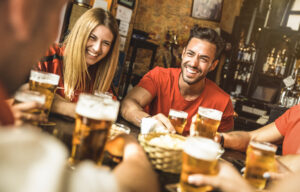
Pubgoers are flocking back to their locals, according to figures that drew a cautious toast from the industry but also prompted warnings of fresh turmoil if the government again singles out hospitality as a winter Covid-19 risk.
Financial figures released by three large chains on Thursday indicated that conditions were improving for the UK’s 47,000 pubs, which have been badly bruised by successive lockdowns and trading restrictions.
Mitchells & Butlers, one of the UK’s biggest pub groups with 1,784 venues, said sales have been at 97% of pre-Covid levels since the resumption of full indoor service in most of the UK on 17 May and have even overtaken 2019 in the eight weeks to 18 September.
Fuller, Smith & Turner, which runs 209 pubs and rents out 175 more, reported recent trading at 86% of pre-pandemic levels but expects that to increase with the gradual return of workers to offices in London, home to 44% of its pubs.
City Pub Group, which has 50 pubs in market towns and cities nationwide, said sales had been above 90% of normal levels, with the return to work likely to drive that number higher.
The most recent industry-wide figures from the trade body the British Beer & Pub Association show that sales in the week ending 5 September were at 95% of 2019.
Despite signs that pub culture is returning to full swing, publicans and leading industry figures warned that the recent improvement was “fragile”, with immediate challenges such as a shortage of both HGV drivers and carbon dioxide – used in fizzy drinks and beer – hampering recovery.
They added that the revival could be snuffed out if a fresh wave of winter Covid-19 cases leads to the restoration of tight restrictions or even closure orders.
Mitchells & Butlers chief executive Phil Urban said the company has seen the strongest sales in pubs that serve food. “It’s a hangover from when we were in more restricted trading times,” he said.
“If you’re sitting having a meal you have your own space, you’re not crammed in with strangers, so customers are adopting that. And when you’ve been forced to not see friends and family for so long, people want to sit down have a meal and have a proper evening out.”
But he said drinkers’ continuing wariness of standing-room-only venues was crimping drinks sales, adding that any government rhetoric targeting hospitality could trigger the return of financial hardship for the sector.
“[Last year] the prime minister was saying ‘Don’t go to pubs’, even though there has never been evidence that pubs and hospitality are more of a cause than anything else,” he said.
“That seed has been planted. There was enough noise to make people a bit nervous about it and that manifests itself in the numbers.”
He highlighted the nationwide lorry driver shortage as a more immediate concern, warning: “You can’t plan for it.”
The Rose Inn, in Norwich, has benefited from the surge in trade after restrictions were eased in May, as well as the return of Premier League football, because it is close to Norwich FC’s Carrow Road ground.
But the publican Dawn Hopkins said her premises was still closed three days a week and trade was much harder to predict, making staffing and stock supply plans more difficult.
“Everyone I talk to says the same, we’ll have a Wednesday that will be absolutely mad and then a Friday that’s quiet,” she said. “There have been changes in how people are working, fewer people meeting up after work and so on. There’s not so much routine.”
The trade body UK Hospitality welcomed signs that pub takings are up but pointed to a litany of lingering concerns, including rising costs putting pressure on profit margins and continuing labour shortages.
The chief executive also highlighted supply chain issues including soaring gas prices and the CO2 shortage.
“Fragile consumer confidence is easily knocked by negative numbers of talk of a plan B,” Kate Nicholls said.
Plan B refers to the possible use of measures such as vaccine passports to enter hospitality venues, as well as the more widespread return of mandatory masks and working from home.
Read more:
Hospitality sector raises a cautious toast as UK pubgoers return
